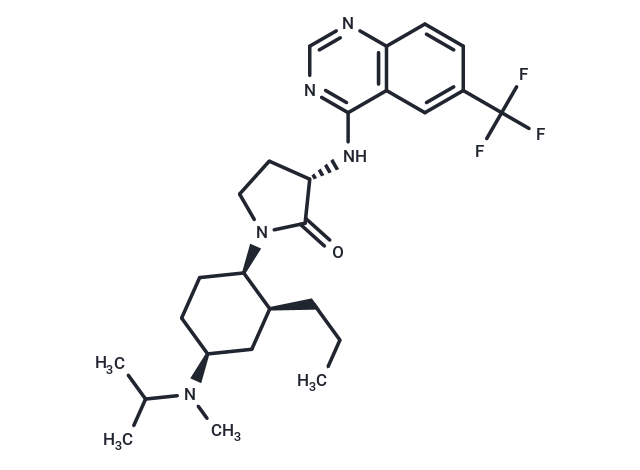- 全部删除
 您的购物车当前为空
您的购物车当前为空
BMS-681
BMS-681 is an orthosteric antagonist of chemokine receptor 2 (CCR2) that forms a ternary complex with CCR2 and its allosteric antagonist, CCR2-RA-[R]. Together, the complex inhibits chemokine binding with BVMS-681 in the orthosteric pocket and CCR2-RA-[R] in the intracellular allosteric G-protein binding site. When chemokine binding is inhibited, modulation responses implicated in several inflammatory and neurodegenerative diseases, including atherosclerosis, multiple sclerosis, asthma, neuropathic pain, diabetic nephropathy, and cancer can be controlled. This action occurs as the migration of monocytes, immature dendritic cells, and T-cell subpopulations towards endogenous CC chemokine ligands is mediated.

BMS-681
BMS-681 is an orthosteric antagonist of chemokine receptor 2 (CCR2) that forms a ternary complex with CCR2 and its allosteric antagonist, CCR2-RA-[R]. Together, the complex inhibits chemokine binding with BVMS-681 in the orthosteric pocket and CCR2-RA-[R] in the intracellular allosteric G-protein binding site. When chemokine binding is inhibited, modulation responses implicated in several inflammatory and neurodegenerative diseases, including atherosclerosis, multiple sclerosis, asthma, neuropathic pain, diabetic nephropathy, and cancer can be controlled. This action occurs as the migration of monocytes, immature dendritic cells, and T-cell subpopulations towards endogenous CC chemokine ligands is mediated.
| 规格 | 价格 | 库存 | 数量 |
|---|---|---|---|
| 25 mg | ¥ 24,900 | 10-14周 | |
| 50 mg | ¥ 33,300 | 10-14周 | |
| 100 mg | ¥ 43,500 | 10-14周 |
产品介绍
| 产品描述 | BMS-681 is an orthosteric antagonist of chemokine receptor 2 (CCR2) that forms a ternary complex with CCR2 and its allosteric antagonist, CCR2-RA-[R]. Together, the complex inhibits chemokine binding with BVMS-681 in the orthosteric pocket and CCR2-RA-[R] in the intracellular allosteric G-protein binding site. When chemokine binding is inhibited, modulation responses implicated in several inflammatory and neurodegenerative diseases, including atherosclerosis, multiple sclerosis, asthma, neuropathic pain, diabetic nephropathy, and cancer can be controlled. This action occurs as the migration of monocytes, immature dendritic cells, and T-cell subpopulations towards endogenous CC chemokine ligands is mediated. |
| 分子量 | 491.59 |
| 分子式 | C26H36F3N5O |
| CAS No. | 2760844-13-9 |
| 存储 | Shipping with blue ice. |





 还可以
还可以

评论内容